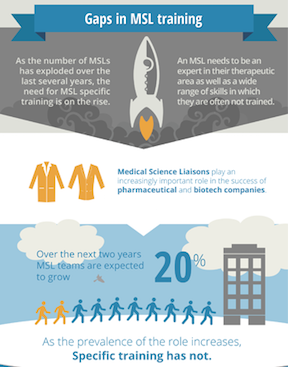Medical Affairs - Do You Have What It Takes To Succeed?
Career Story by Yuriy Shapovalov, Medical Science Liaison at Biogen
 When I made the decision to move from academia to industry, the biggest question that entered my mind was “Would I be a good fit for this environment?” A career in the medical affairs division of a biotechnology or pharmaceutical company is one of several opportunities available to Ph.D. graduates who contemplate a move from the bench. But like with many of those choices, at the time I did not have much information about what medical affairs was and whether people like me had succeeded there before. My academic mentor suggested that I talk to somebody who actually worked in a medical affairs role and who could share their experience. And that is how my journey began in finding a first job in industry.
When I made the decision to move from academia to industry, the biggest question that entered my mind was “Would I be a good fit for this environment?” A career in the medical affairs division of a biotechnology or pharmaceutical company is one of several opportunities available to Ph.D. graduates who contemplate a move from the bench. But like with many of those choices, at the time I did not have much information about what medical affairs was and whether people like me had succeeded there before. My academic mentor suggested that I talk to somebody who actually worked in a medical affairs role and who could share their experience. And that is how my journey began in finding a first job in industry.
For several decades, medical affairs has continued its rapid growth as one of the foundations of the successful business strategy for the leading biotechnology, pharmaceutical, and device manufacturing companies. In one sentence, medical affairs professionals use their training and skills to provide medical and scientific support to external and internal stakeholders. Such a unique position within the company organizational structure – combined with the ever-changing regulatory landscape – has transformed medical affairs into a dynamic, exciting, and complex enterprise that attracts many highly qualified individuals.
During my first conversation with a person who worked in medical affairs, I was curious to learn how she would evaluate my credentials, whether I “fit the mold” of somebody who would be an attractive candidate to potential employers. After I proudly and confidently described my previous career path, she replied in a casual tone, “Yes, you would be a very good applicant for a medical affairs position. But so would countless other researchers, physicians, and pharmacists who are looking to break into this field, or many other fields that are available to people with advanced education and experience in biomedical sciences”.
And herein lies a profound and somber reality of today’s competitive landscape – you must distinguish yourself from a group of peers that includes intelligent, driven, and well-prepared individuals who share similar aspirations and goals with you. Most likely, you have heard this reality before and likely, you may have been told that there is no surefire recipe to distinguish yourself. Although this is true in general, I would argue that several traits would distinguish somebody who can realize their ambitions successfully.
Perseverance was a crucial factor in my efforts to get that first phone interview, that first conversation with the hiring manager, that first site visit to meet with the team members. There may be times when you would feel that rejection and despair have become overwhelming, but what defines you as an individual is how well you can manage setbacks and disappointments. Throughout the job search, I continued to refine my resume, to have conversations with experienced industry professionals, and to seek additional opportunities to learn more about the role I was pursuing.
Another important quality that I would emphasize is having an open mind and willingness to receive feedback. There are many intangibles that influence a hiring decision, besides the numerous accomplishments in black and white on your CV. And those intangibles are nearly impossible to predict or control, but as you accumulate more experience during the interview process, even failures could be used as an opportunity to grow, as a stepping stone that elevates you above others. Even now, I frequently seek feedback from my peers and managers – in my mind, there is always room for improvement.
Finally, all the strategies in the world would be largely futile if you do not establish and maintain a network of mentors, advisers, and peers who can be your treasure trove of wisdom. People who can serve as a sounding board to share frustration and success, to devise strategies and practice interviews, and who can provide references and point to valuable resources. I would urge that in your quest for the next dream job, you participate in career fairs and seminars offered during scientific conferences that you regularly attend, reach out to your academic counsellors and professors, and explore programs such as URBEST that could link you directly to alumni who had ventured out onto exciting career paths.
I am confident that all of you have what it takes to succeed, whatever path you select.
Tracey Baas | 7/20/2017
You may also like
No related posts found.
